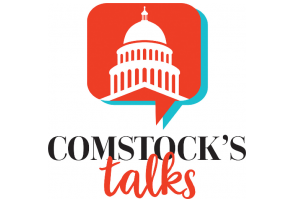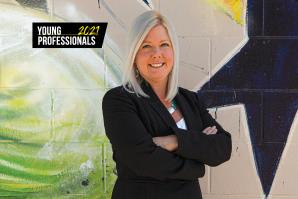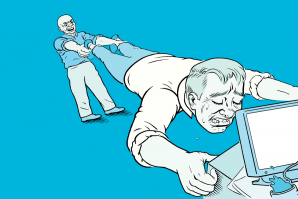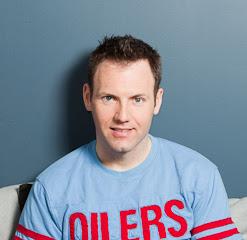Jeff Wilser is the author of “The Book of Joe: The Life, Wit, and (Sometimes Accidental) Wisdom of Joe Biden” from Three Rivers Press. He has written five previous books, including “Alexander Hamilton’s Guide to Life.” His writing has appeared in print or online in New York magazine, GQ, Condé Nast Traveler, TIME, Glamour, Cosmo, Esquire, mental_floss, Men’s Fitness, Los Angeles Times, Chicago Tribune, Comstock’s, The Miami Herald, Detroit Free Press and The Huffington Post. For more, visit www.jeffwilser.com.
By this person

Comstock’s Talks: Are You Ready for the TikTok Challenge?
PODCAST: Social media can grow a business’s audience — but only if it’s done right.

Are You Ready for the TikTok Challenge?
Social media can grow a business’s audience — but only if it’s done right.

On the Rise: Dina Gentry
Meet 12 young leaders who are shaping their industries and the Capital Region
Dina Gentry is the communications director for the El Dorado County Office of Education, a role that impacts thousands of students and families across 15 school districts.

On the Rise: Gerardo Aceves and Amit Dhugga
Meet 12 young leaders who are shaping their industries and the Capital Region
Gerardo Aceves and Amit Dhugga are CEO and president of Platinum Express, a Yuba City-based company with a fleet of 100 trucks.

Comstock’s Talks: The Power of Empathy
PODCAST: More companies are finding that more care brings more success.

The Power of Empathy
More companies are finding that more care brings more success
It’s not just a matter of altruism or having a heart: Empathy is innovation’s secret sauce.

Silver Linings
The pandemic has crushed most of the tourism industry, but some businesses have defied the odds
While many small and not-so-small businesses were roiled, some
have seen a windfall with people desperate to hop in their cars
and do something, anything, besides cook another dinner at home
and watch more Netflix.

Where’s the Party?
Companies have to get more creative to replace familiar holiday events of yore
Employers have been scaling back their annual holiday parties for
years. What will they look like in 2020?

Remote Controls
There are plenty of good — and possibly bad — aspects about so many people working away from their offices
This coronavirus pandemic could mark the biggest shift to the workplace since the adoption of computers.

Building for the Ages
The construction industry needs to overcome a labor shortage, generational shift and new challenges brought on by the coronavirus pandemic
The COVID-19 pandemic is accelerating both stubborn challenges and surprising opportunities for the construction industry.

Battling Burnout
There are many reasons workers suffer from chronic workplace stress — and ways to overcome it
Too much stress costs employers $300 billion a year, according to The American Institute of Stress, as burnout can lead to employee turnover, lack of motivation and dips in productivity.

Building Resiliency
Updated building codes have helped save homes during wildfires, but should California do more?
2.7 million residents live in areas with a high risk of wildfire, and the scarcity of urban real estate pushes construction toward the wooded areas most likely to ignite. Should this be allowed?

Recycling: Turning Trash Into Energy
FastOx gasification could be the solution to our recycling crisis
Every year, the United States generates around 260 million tons of trash. And no one knows what to do with it. No one, that is, except serial entrepreneur Mike Hart, the CEO of Davis-based Sierra Energy.
Part of this month’s Innovation issue

Office Relief
Businesses are bringing yoga into the workplace and finding that relaxation and mindfulness are lucrative
Welcome to the world of office yoga, a curious merger of yoga and commerce that is proving itself to be lucrative.

Stop Fearing Failure
If your business or career isn’t working, it’s time to regroup and rebound
Henry Ford dreamed of mass-producing cars. So he started the Detroit Automobile Company … and it flopped. Oprah Winfrey was fired from her first job at a TV station. Before she dominated the world of fashion, Vera Wang failed to realize her original dream — making it as an Olympic figure skater.

Meeting Goals
Sure, we all hate meetings — but they are essential, and there are ways to make them better
I bet you a cup of coffee that you are reading this just before a meeting, or maybe just after. Another bet: You feel that there are too many meetings. A third: This gauntlet of meetings can make it tough — or impossible — to finish your work.

Name Games
Is “Farm-to-Fork Capital” enough, or does Sacramento need another new brand?
Sacramento has struggled with its branding for more than a century. Recently, the farm-to-fork movement has raised awareness of the local food scene, but as the region also tries to highlight its growth in business, tech, art and culture, a new brand is in the pipeline.

Getting Creative
Sacramento’s Creative Edge plan aims to make the city more desirable and spur the economy
Art is often dismissed as “nice to have,” a tougher pill to swallow than funding public safety agencies. But culture has been shown to make a city more desirable — and that can have a booming effect on a local economy.

In the Age of Isolation
Sacramento State professor says lonely employees are hurting your business’ bottom line
Imagine your boss asking you these questions:
How often do you feel you have nobody to talk to?
How often do you feel shut out and excluded by others?
How often do you feel as if nobody really understands you?

The Voice of Capital Region Chambers Is Decidedly Female — Here’s What They Have to Say
There are roughly 50 chambers in the Capital Region, and we counted over 30 led by women. We asked a dozen of these leaders (doing our best to bring in a mix of voices) to tell us where they see the region headed.

The Neurological Reasons You’re Up Against Deadlines, and How to Make a Change
Do you find yourself unable to get ahead of your deadlines? Can’t shake the feeling that you do your best work under pressure? Turns out, you might be addicted to procrastination-induced adrenaline.

Booms and Busts
A brief overview of housing in the Sacramento region
From the squatters who went up against John Sutter to the 2008 Great Recession, we take a long view of the history of housing cycles in the Sacramento region.

Go Fund Yourself
When it comes to fostering and attracting innovative business, does the Capital Region have enough capital?
Does the Capital Region have enough capital? One expert estimates there is about a half billion in funding with only have of that invested. So how are local startups getting funded, and is the pool enough to draw more of them here?

Book It
Why you should read more — and, more importantly, how to do it
The benefits of reading are extensive, and CEOs like Bill Gates and Warren Buffett read at least 50 books a year. Local leaders discuss why they read and, more importantly, how they find the time.

The Way We Work
Six Sacramento executives give us a glimpse into a day in their (very busy) lives.
We tracked the routines of six business executives and paired that data with organizational management insights. Here’s how they tame the chaos.

Pour Me Another
How one writer’s quest to go coffee-free brought him back to the beverage he loves
We all have a morning routine, and for 62 percent of American adults it involves coffee. But is it healthy? Our writer Kicked his caffeine habit for 10 days — here’s what he learned.

The Business Of Online Business
Eight tips from local entrepreneurs succeeding in this crowded realm
Stephanie Stiavetti had an IT job that she liked in Sacramento, managing a company’s servers, mobile devices and computers. Yet her real passion was cooking. She had attended culinary school, designed recipes, dabbled in freelance food writing and had even written a cookbook.

Lost in Translation
Are the very digital tools designed to enhance communication actually making us worse communicators?
Most of us can’t seem to put down our phones, checking them anywhere from 80 to 150 times per day, and some experts say this addiction is taking a toll on soft skills.

Ms. Message
Sacramento has stellar gender parity stats in its advertising industry — here’s what it means for the region.
Women dominate the creative community in Sacramento, with a slew of advertising agencies large and small with females at the helm. The women running them say this means not only more authentic messaging, but a stronger support system for the next generation.

Innovation Unlocked
Local brainiacs offer five habits for flexing your creative-thinking muscles
Intelligence might be built into our DNA, but what about creativity and problem-solving? Not so, experts say. So, if it can be taught, how can we learn? We ask some local brainiacs for their tips for inspiring outside-the-box thinking.

Bridging the Gap
Navigating the generational divide is essential to preparing for a solid succession
The generational divide can wreak havoc on financial management, succession planning and operations. And regardless of where the tension arises, the root of the issue remains the same: control.

Get Focused
The science behind why multitasking is ruining your ability to get things done
What if we’re doing it all wrong? What if instead of trying to do 37 things at once, we just try and do one thing at a time — what some productivity experts call either “mono-tasking,” “mono-focus” or “uni-tasking”— and do the job well?

Performance Art
Artistic offices lead to more productive and engaged teams
Art in the workplace is more than cosmetic; it can actually improve employee attitudes, performance, and even the company’s bottom line. This feels almost blasphemous. By definition, we think of “art” and “profit” as two distinct and even clashing concepts, with the unspoken assumption that chasing profits will corrupt art, and that art drags down profits. Conventional wisdom says “art for art’s sake”: Art is not a means to an end, art is the end.

Mysteries of the Gut Instinct
Unraveling the science of the body’s ‘second brain’ offers insight into the role the stomach plays in our mental health
We’ve all been there: You’re waiting to give a big presentation, maybe you dread public speaking, and you feel your stomach twist itself into a pretzel. Or maybe you meet someone new, someone interesting, and when they make eye contact you feel your stomach do a joyful little flip. It happens all of the time. We feel things before we have time to mentally process.

Mind Boosters
Studies show certain foods preserve cognition into the twilight years... but can brain foods make you smarter today?
As we get older and become more at risk for Alzheimer’s, a certain type of diet can boost our cognitive potency. Decades ago, science proved food can impact our heart health. Why should the brain be different?

Gen Z at Work
The oldest members of gen Z (born in 1996) are now graduating college, flooding offices across America with their cheery, five-screen-watching, can-do spirit.

Dialing Up
Generation Z left the tech transition in the dust — how will that impact their role in our economy?
In some ways they might already be an economic force. A 2014 study from the ad agency Sparks and Honey estimates that the average gen Z receives $16.90 per week in allowance alone, which tallies to an annual $44 billion in spending power. So who are these kids, anyway?

Tricky Moves
Changing regulations and confusing compliance metrics have HR managers tied up in knots
AB 908 increases the amount of paid family leave (PFL) benefits an employee can receive from 55 percent of earnings to either 60 percent or 70 percent of earnings, depending on the employee’s income,” effective Jan. 1, 2018? (Mark your calendars.)

Close Associates
Romance can bloom in unexpected places, but don't let an office relationship result in career breakdown
Fifty-one percent of professionals have had a workplace romance, according to a 2015 survey from Vault.com, a career resource website. This includes couples like the Obamas and the Gates. In an online poll of Comstock’s readers, 80 percent admitted to having mixed business with pleasure.

In The Blue
The cost of depression hits hard, but the good news — for staff and CEOs alike — is that businesses are getting proactive in their approach to it
While many of us are blissfully unaware of depression’s prominence in the workplace, those in HR, who are on the frontlines and can see the disease’s broader impact, have a more clear-eyed perspective.

Take It Easy
U.S. workers are taking less and less vacation — here’s what their employers are losing to the vacation gap
You probably need a vacation. Most of America does. Between 1976 and 2000, the average worker took roughly 20 vacation days annually, according to data from Project: Time Off. But as the economy buckled in 2008, so did our desire to flock to the beach, and in 2015, the number plunged nearly a full week lower, translating to 658 million unused vacation days.

Game Face
For Kevin Nagle, Capital Region sport connoisseur, failure has never been an option
How did Nagle, now 62, go from weed-puller to angel investor? He shares his maxims of leadership, including how he somehow reads 300 emails a day, makes work an obsession and why he feels soccer is the future of America.

The Strong, Silent Type
What secret powers your introverted employees may have — and how to unleash them.
No job is only a job. You are paid to be competent and to get your work done, sure. But there are countless social interactions that shade the way you’re evaluated: chit-chat on the elevator, poise in a meeting, even the stories you tell (or don’t tell) over happy hour. Connections are the key to raises, promotions and job offers.

In Safe Hands
What the leaders of Sacramento’s health care system have to say about care quality and gender equality
Of the four largest private employers in the region, three of them are health systems — Kaiser (10,000 employees), Sutter (9,000) and Dignity Health (7,000). And whether it’s a new trend, a bit of gender-equity karma or just a wonderful coincidence, in this critical sector of the economy, all four of the region’s health centers are led by female executives.

More Than A Feeling
In the quest for funding, charitable organizations need more than a mission — they need a plan
For more and more investors and would-be funders, nonprofits need to have more than a worthy cause and a compelling mission: They need a plan. Specifically, they’re now being asked to showcase the same mindset that’s required of for-profit organizations, meaning that spreadsheets, metrics and core competencies can matter just as much as pulling the heartstrings.

7 Killer Financial Management Apps
Thanks to a growing pool of financial apps, we can now review our budgets, tweak our investments and work toward retirement — all while waiting in line for a coffee.

The Dean Can Read Your Mind
Pierre Balthazard has spent years studying the brains of top bosses and now, he says he can neuro-train the brain into better leadership
Imagine a world where you’re hooked to a system of electrodes that scans your skull, hunts for patterns, and then scores your IQ, emotional intelligence, ability to communicate, capacity for judgment and potential to be a good leader. Then imagine that the therapist says, “The bad news is that your score should be higher. The good news is that I can get it there by helping you physically change your brain.”

Can Neurofeedback Change Your Brain?
Evidence suggests that it has the potential to treat common ailments, without medication
Thirty years from now, we all might be getting some sort of neurofeedback. Scientists are now using this cutting-edge method — a way of scanning the brain and giving it course corrections — to treat a battery of conditions that range from ADHD to depression and seizures.

Data-Driven
While big data can answer questions we haven’t even thought to ask, the hidden costs add up
Big data can have real benefits, but it can also undercut common sense, frustrate employees, alarm customers and come with some hidden costs

Vision Reframed
VSP is changing the way we think about eyewear — and ideation
“In order for a company like VSP to be around for 60 years, we’ve had to be innovative — to change who we are,” says incoming CEO Jim McGrann, who used to be the company’s Chief Technology Officer. Plenty of companies like to toss around buzzwords like “innovation,” but it’s usually just an empty slogan. VSP has spurred innovation by creating The Shop, launching their Project Genesis, and supporting a 90-day rotational program that lets everyday employees — no matter what division they work in — pitch new ideas and brainstorm new products.



